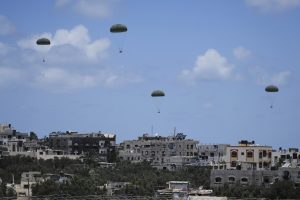Muslim convert sentenced to life in prison over plot to bomb targets in U.S., London
LONDON – An al-Qaida operative was sentenced to life in prison Tuesday for plotting to bomb the New York Stock Exchange and other U.S. financial targets and blow up landmark London hotels and train stations with limousines packed with gas tanks, napalm and nails.The plans were designed to cause maximum carnage, the judge told Dhiren Barot, who stared blankly ahead as he learned he would not be eligible for parole for at least 40 years – one of the harshest sentences ever meted out in a British court.Barot, a 34-year-old British convert to Islam who pleaded guilty last month to conspiring to commit mass murder, remains wanted by the United States and Yemen on separate terror-related charges. Under British law, he could be temporarily transferred to the United States to stand trial.Investigators said Barot traveled the world to gain terrorist training, meeting terror leaders including Khalid Sheik Mohammed, the alleged architect of the Sept. 11, 2001, attacks on New York and Washington.Born in India and raised in London, Barot began plotting in 2000 to attack a host of financial industry targets in the United States. Investigators said he shelved the plan after the 9/11 attacks, focusing his efforts on ways to detonate limousines loaded with gas, napalm and nails.His targets included landmark London hotels such as The Ritz and The Savoy, and railway stations such as London’s Waterloo, Paddington and King’s Cross, prosecutor Edmund Lawson said at the two-day sentencing hearing.Barot fantasized about blowing up a subway train as it traveled in a tunnel below the River Thames – an attack that could “cause pandemonium … explosions, flooding, drowning,” according to documents filed with the court. Other planned attacks involved a radioactive dirty bomb and exploding a gasoline tanker.”The conspiracy was in its final stages,” Lawson said. The prosecutor said Barot submitted detailed proposals in February 2004 to al-Qaida financiers in Pakistan. It said the limousine plan required a six-man team and would kill hundreds. Barot estimated the cost would be about $115,000.Proposals for the British attacks and strikes against the International Monetary Fund in Washington, the Citigroup headquarters in New York and the Prudential building in Newark, N.J., were sent like “corporate reports going to head office,” Judge Neil Butterfield said.Prosecutors acknowledged they had no firm timeframe for the attacks. Barot’s lawyer, Ian MacDonald, pleading for leniency, said Tuesday the plans were “rough and exploratory” and far from fruition.Details of the planned attacks in London resurrected fears of the July 7, 2005, suicide bombings that killed 52 people aboard three subways and a bus last year. The bombings deepened divisions between Muslims and non-Muslims, provoking an angry debate in Britain over religious tolerance and ethnic assimilation.”There are thousands and thousands of ordinary, decent, hardworking, law-abiding Muslims – British citizens just like you – who have to live their lives under a deep cloud of suspicion and distrust caused by you and others like you,” Butterfield said.Inayat Bunglawala of the Muslim Council of Britain said he feared the case would add to prejudice against Muslims.”I think there is concern about wider public attitude toward Muslims, attitudes that already had the whiff of the lynch mob about them,” Bunglawala said.The sentence was unusually harsh in Britain, where only around 25 people have received terms that condemn them to die behind bars. By comparison, an IRA hitman who in 1984 tried to assassinate former Prime Minister Margaret Thatcher with a bomb was sentenced to life without possibility of parole for 35 years.The severe punishment was well deserved, said Peter Clarke, Britain’s top anti-terrorist detective: “He is a long-term, dedicated, committed member of al-Qaida.”Investigators uncovered some of the evidence stored on computers seized at the home of an alleged al-Qaida computer expert in Pakistan in July 2004, prosecutors said. Additional clues were found in the garages and homes of Barot’s seven alleged accomplices.A videotape shot while Barot was visiting New York in March 2001 was among evidence uncovered in the haul. The shaky footage – shown on screens in the courthouse – zoomed in on the World Trade Center’s twin towers as a man is heard mimicking the sound of an explosion. It was found spliced into a videotape copy of the movie “Die Hard With A Vengeance.””It is memorable for its macabre prophecy,” Lawson said. Barot is not believed to have had prior knowledge of the Sept. 11 attacks.Officials in the U.S. said previously they would consider extraditing Barot once the British case against him was concluded. Federal prosecutors in Manhattan could not say Tuesday if they intended to proceed with the request.The Associated Press, The British Broadcasting Corp., and Times Newspapers Ltd. successfully challenged a court ruling that threatened to prevent news media reporting details of Barot’s sentencing hearing.Butterfield had ruled that publishing details of the case could prejudice trials of Barot’s co-defendants, scheduled to take place in London next year.










